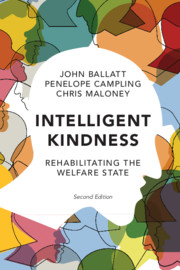Book contents
- Intelligent Kindness
- Reviews
- Intelligent Kindness
- Copyright page
- Contents
- Foreword
- Authors’ Note
- Chapter 1 The Heart of the Matter
- Chapter 2 Rescuing Kindness
- Chapter 3 A Politics of Kindness
- Chapter 4 Building the Case for Kindness
- Chapter 5 Managing Feelings of Love and Hate
- Chapter 6 The Emotional Life of Teams
- Chapter 7 Cooperation and Fragmentation
- Chapter 8 On the Edges of Kinship
- Chapter 9 Unsettling Times
- Chapter 10 Free to Serve the Public?
- Chapter 11 Blame
- Chapter 12 The Hostile Environment
- Chapter 13 The Pull towards Perversion
- Chapter 14 Cultivating Intelligent Kindness
- Chapter 15 Rehabilitating the Welfare State
- Index
- About the Authors
- Acknowledgements
- References
Chapter 9 - Unsettling Times
Published online by Cambridge University Press: 28 February 2020
- Intelligent Kindness
- Reviews
- Intelligent Kindness
- Copyright page
- Contents
- Foreword
- Authors’ Note
- Chapter 1 The Heart of the Matter
- Chapter 2 Rescuing Kindness
- Chapter 3 A Politics of Kindness
- Chapter 4 Building the Case for Kindness
- Chapter 5 Managing Feelings of Love and Hate
- Chapter 6 The Emotional Life of Teams
- Chapter 7 Cooperation and Fragmentation
- Chapter 8 On the Edges of Kinship
- Chapter 9 Unsettling Times
- Chapter 10 Free to Serve the Public?
- Chapter 11 Blame
- Chapter 12 The Hostile Environment
- Chapter 13 The Pull towards Perversion
- Chapter 14 Cultivating Intelligent Kindness
- Chapter 15 Rehabilitating the Welfare State
- Index
- About the Authors
- Acknowledgements
- References
Summary
The attitudes, emotions and actions of staff are powerfully influenced by the culture within which their work takes place. In turn, the culture of an organisation arises from the ways in which tasks, priorities, values, anxieties and relationships are viewed and managed in the system as a whole. This matrix of influences is internalised by all involved, as the context for the individual’s reactions to experience.
Larry Hirschhorn, former President of the International Society for the Psychoanalytic Study of Organizations, has termed this ‘the workplace within’ (Hirschhorn, 1988) whilst David Armstrong, a principal consultant at the Tavistock Consultancy Service, London, uses the term ‘the organisation in the mind’ (Armstrong, 2005). The core concept is that staff members have an internal working model of the organisation, part conscious, part unconscious. This colours their experience, how they understand their tasks, and how they manage themselves both in their own roles, and in their work with others.
- Type
- Chapter
- Information
- Intelligent KindnessRehabilitating the Welfare State, pp. 115 - 135Publisher: Cambridge University PressPrint publication year: 2020

